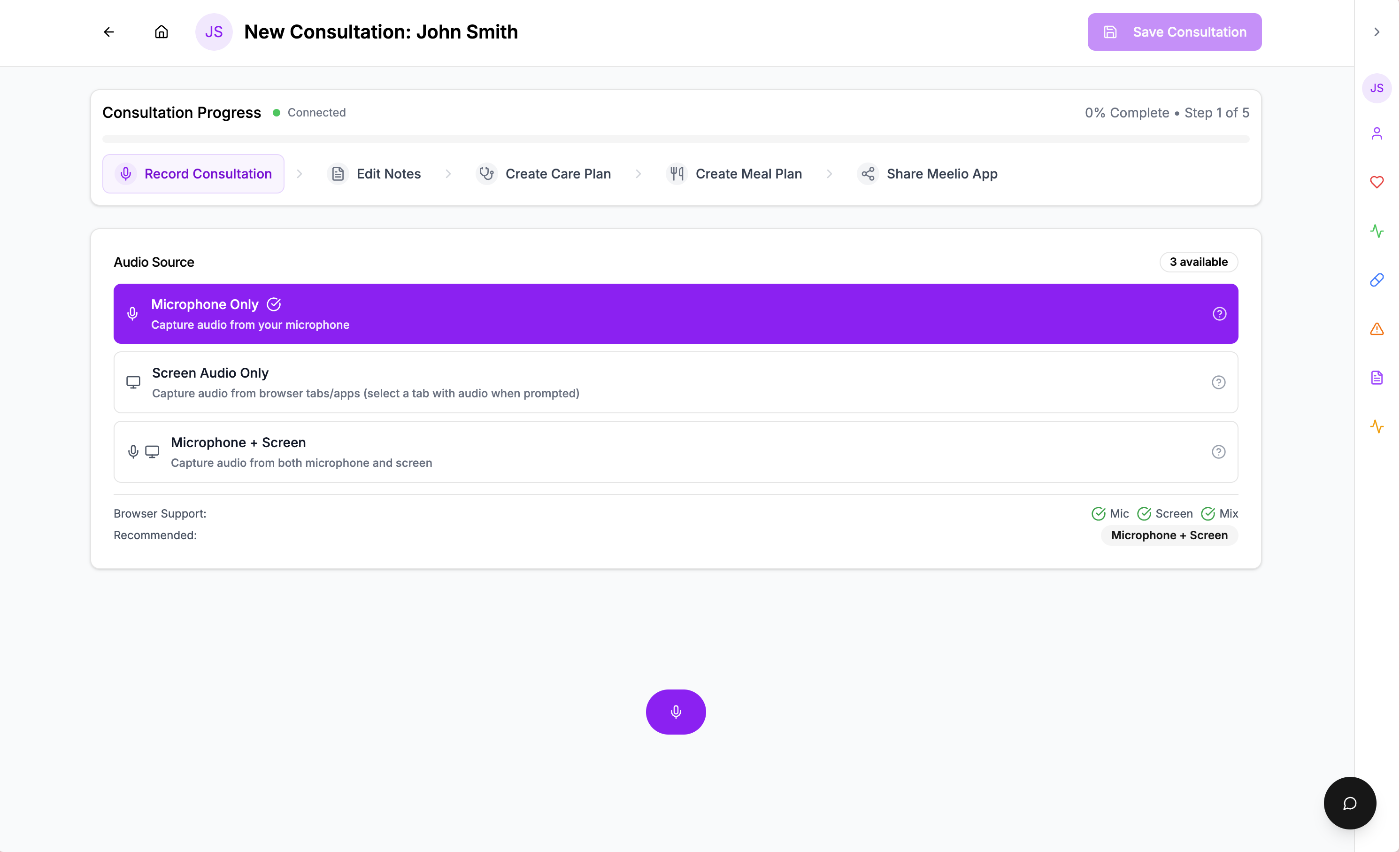
Gastroenterologists spend 45-50 minutes on EHR tasks for every hour of patient time. Discover how AI medical scribes specifically designed for gut health practices can save 4+ hours daily while transforming patient care.
An AI medical scribe for gastroenterology is a specialized artificial intelligence solution that automatically generates clinical documentation during patient encounters, specifically trained to understand the complex terminology, procedures, and workflows unique to gastrointestinal medicine.
Unlike generic AI scribes that attempt to serve all medical specialties, gastroenterology-focused AI scribes are built with deep knowledge of GI-specific conditions like inflammatory bowel disease (IBD), irritable bowel syndrome (IBS), gastroesophageal reflux disease (GERD), and the intricate procedures that define modern GI practice. Learn more about how AI is transforming gut health management.
Ambient Listening Technology: Modern AI scribes use sophisticated ambient listening that captures natural conversations between physicians and patients without requiring specific voice commands or structured speech patterns.
Natural Language Processing for Medical Terminology: Advanced NLP models trained on millions of gastroenterology encounters can distinguish between "sigmoid colon" and "descending colon," understand the nuances of bowel movement descriptions, and accurately document complex symptom patterns. Meelio leverages Deepgram's Nova-3 transcription AI, a best-in-class medically trained transcription engine that delivers 30% better accuracy for medical terminology compared to general-purpose transcription models.
Specialty-Specific Training Data: Leading solutions like those validated by board-certified gastroenterologists are trained on extensive datasets of actual GI consultations, endoscopy reports, and chronic condition management protocols.
Traditional transcription services simply convert speech to text, requiring significant physician time for review and editing. AI medical scribes for gastroenterology go beyond transcription by:
Research from the American Medical Association shows that 61% of GI provider time is spent away from patients, with gastroenterologists facing unique documentation burdens that exceed many other medical specialties.
Complex Chronic Condition Management: Gastroenterologists typically manage patients with long-term conditions requiring detailed tracking of symptoms, treatments, and outcomes over months or years. A single IBD patient may require documentation of:
Endoscopy Procedure Documentation Requirements: Each colonoscopy, EGD, or specialized procedure requires extensive documentation including:
Long-term Patient Monitoring Needs: GI patients often require ongoing monitoring between visits, creating documentation challenges for:
Studies published in Clinical Gastroenterology and Hepatology indicate that GI providers spend 52+ hours monthly on administrative tasks, significantly more than the healthcare average.
The American Gastroenterological Association reports that documentation burden creates a $72,000 annual loss per provider due to:
Direct Productivity Loss: Time spent on documentation instead of patient care reduces the number of patients that can be seen daily, directly impacting revenue.
Opportunity Cost Analysis: With average GI consultation fees ranging from $200-400, every hour spent on documentation represents 2-3 missed patient encounters.
High documentation burden contributes to physician burnout: According to Mayo Clinic Proceedings research on physician burnout, administrative tasks are a primary contributor to physician dissatisfaction, leading to costly turnover, recruitment expenses, and temporary staffing needs.
The implementation of AI medical scribes in gastroenterology practices delivers measurable improvements across multiple key performance indicators.
Real-World Results: Dr. Ruth Rawlings, a practicing gastroenterologist, reported seeing 5 additional patients per day after implementing AI scribe technology, representing a 25% increase in patient volume without extending work hours. This improvement is attributed to the exceptional accuracy of medical-grade transcription engines—Meelio's implementation of Deepgram Nova-3 ensures that even complex GI terminology like "pseudomembranous colitis" or "esophagogastroduodenoscopy" is transcribed with 99.1% accuracy, eliminating time-consuming manual corrections.

Daily Time Savings: Leading AI scribe solutions report 3-4 hours of daily time savings per physician, allowing gastroenterologists to:
According to research published in the Journal of Medical Internet Research, patient volume increases of 25-50% are commonly reported when AI scribes eliminate documentation bottlenecks.
AI medical scribes enable gastroenterologists to maintain direct eye contact and engagement during consultations, leading to:
Improved Communication of Complex GI Conditions: When physicians aren't focused on typing or note-taking, they can better explain complex conditions like Crohn's disease progression or FODMAP elimination protocols.
Better Symptom Assessment: Direct patient interaction allows for more nuanced questioning about bowel habits, pain patterns, and quality of life impacts.
Increased Patient Satisfaction: Patients report feeling more heard and understood when physicians can maintain full attention during consultations.
Continuous Monitoring Capabilities: Advanced solutions like Meelio's AI-powered patient mobile app extend engagement beyond the clinic visit through integrated mobile apps that track symptoms and treatment adherence.
GI-Specific Terminology Excellence: Building on Nova-3's medical transcription foundation, Meelio's AI achieves higher accuracy rates when documenting:
ICD-10 Coding Assistance: Advanced AI scribes suggest appropriate diagnostic and procedure codes, reducing coding errors and ensuring optimal reimbursement.
Audit-Ready Documentation: Automated documentation often exceeds manual note quality in completeness and structure, providing better protection during audits or quality reviews.
When evaluating AI medical scribe solutions for your gastroenterology practice, prioritize these essential capabilities:
GI Procedure Terminology: The AI should understand and accurately document complex procedures like:
Endoscopy Report Integration: Look for solutions that can automatically generate structured endoscopy reports with:
Chronic Condition Tracking: The AI should excel at documenting ongoing management of:
Epic, Cerner, AthenaHealth Compatibility: Ensure seamless integration with your existing EHR system, including:
Workflow Seamlessness: The best AI scribes integrate so smoothly that they feel like a natural extension of your current documentation process, not a separate system requiring workflow changes.
Transcription Excellence with Deepgram Nova-3: Meelio's partnership with Deepgram provides access to Nova-3, the most advanced medically trained transcription AI available. This foundation ensures:
Learning from Provider Feedback: Look for AI that improves over time by learning from physician corrections and preferences, adapting to individual documentation styles.
Superior Accuracy: Meelio's integration of Deepgram Nova-3 delivers the highest transcription accuracy available for medical content, with 99.1% accuracy for complex gastroenterology terminology—significantly outperforming general-purpose AI models by 30% on medical content.
Mobile App Connectivity: Solutions like Meelio's AI co-pilot extend beyond documentation to include patient-facing mobile applications that:
Symptom Tracking Integration: The most advanced solutions connect clinic documentation with patient-reported outcomes, creating a continuous feedback loop for better care management.
Treatment Plan Automation: Look for AI that can automatically generate personalized treatment plans and meal plans, particularly valuable for conditions like IBS requiring dietary management. Explore how Meelio automates nutrition therapy for healthcare professionals.
Unique Positioning: Meelio stands alone as an AI co-pilot specifically designed for gut health clinicians, offering the only solution that combines AI medical scribing with comprehensive patient engagement tools.
End-to-End Patient Engagement: Unlike competitors that focus solely on documentation, Meelio creates a powerful data feedback loop between treatment plans and patient outcomes through:
Meelio's Technical Architecture: Meelio's AI co-pilot combines multiple advanced technologies to deliver superior gastroenterology documentation:
Mobile App Integration: Patients receive interactive apps connected to their treatment plans, enabling:
Proven Results: Early adopters report 55% faster symptom reduction and 85% patient engagement rates, significantly higher than traditional static PDF treatment plans. Learn more about Meelio's AI-powered approach to gut health management.
DeepScribe: Enterprise-Focused Accuracy
S10.AI: Specialty-Specific Customization
Freed.ai: User-Friendly Interface
Comparative Analysis:

Practice Size Considerations:
Integration Requirements Assessment:
ROI Calculation Framework:
Change Management Strategies:
Training Timeline:
Measuring Success Metrics:
Meelio AI Co-pilot:
DeepScribe:
S10.AI:
Freed.ai:
Direct Cost Savings (Annual per physician):
Total Annual Benefit: $125,000-220,000 per physician
Investment Costs (Annual per physician):
Net Annual ROI: 900-3,000% in year one, with higher returns in subsequent years
Most gastroenterology practices achieve break-even within 2-4 months of implementation, with full ROI realized within 6-8 months.
Factors Affecting ROI Timeline:
Predictive Analytics Integration: Future AI scribes will incorporate predictive modeling to:
Advanced Clinical Decision Support: AI will expand beyond documentation to provide:
Genomic and Microbiome Integration: Next-generation AI will incorporate:
The future of AI medical scribes includes seamless telemedicine integration:
FDA Guidance Evolution: The FDA's guidance on AI/ML-based medical devices continues developing frameworks for AI medical devices, with implications for:
Professional Liability: As AI becomes more sophisticated, professional liability considerations include:
The evidence is clear: AI medical scribes represent a transformative opportunity for gastroenterology practices struggling with documentation burden and patient engagement challenges. With 61% of GI provider time currently spent away from patients and financial losses of $72,000 annually per physician, the cost of inaction continues to grow.
✅ Dramatic Time Savings: 3-4 hours daily reduction in documentation time
✅ Improved Patient Care: Enhanced engagement and communication during visits
✅ Financial Impact: $125,000-220,000 annual benefit per physician
✅ Competitive Advantage: Early adopters see 25-50% patient volume increases
✅ Future-Ready: Position your practice for emerging AI capabilities
Unlike generic AI scribes, Meelio's AI co-pilot is purpose-built for gut health practices, offering the only solution that combines:
The future of gastroenterology is intelligent, efficient, and patient-centered. With Meelio's AI co-pilot, you're not just adopting documentation technology—you're transforming the entire patient care experience.
Q: How does Meelio's AI compare to other medical scribes for gastroenterology?A: Meelio is the only AI solution designed specifically for gut health practices, combining documentation with patient engagement tools. While others focus solely on note-taking, Meelio creates a complete care ecosystem with mobile apps, treatment plan automation, and continuous patient monitoring.
Q: Can AI scribes handle complex GI procedures like colonoscopies?A: Yes, advanced AI scribes trained for gastroenterology can document complex procedures including colonoscopy findings, polypectomy details, and biopsy locations. Meelio's AI is specifically trained on GI terminology and procedures.
Q: What's the typical implementation timeline for a GI practice?A: Most practices complete implementation within 4-6 weeks, including training and optimization. Physicians typically become proficient within 1-2 weeks of regular use.
Q: How does patient data security work with AI medical scribes?A: Leading solutions like Meelio maintain HIPAA compliance with end-to-end encryption, secure data transmission, and audit trail maintenance. Patient data is protected throughout the documentation process.
Q: Will AI replace gastroenterologists?A: No. AI medical scribes augment physician capabilities by handling documentation and administrative tasks, allowing gastroenterologists to focus on complex clinical decision-making and patient care. The technology enhances rather than replaces medical expertise.
Ready to transform your gastroenterology practice with the most advanced AI co-pilot available? Join leading GI practices already saving 4+ hours daily while achieving 55% faster patient symptom reduction. Learn more about Meelio's complete AI platform for gut health professionals.
Schedule a Meelio Demo | Explore Meelio's AI Platform | Learn About Patient Mobile App








